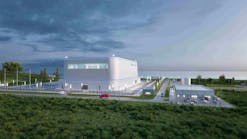Dartmouth drilling Geothermal test wells on Campus beginning this week
Ivy League institution Dartmouth College is drilling geothermal test wells at four locations starting this week as it transitions to a noncombustion energy future.
The research school plans to eliminate the use of fuel oil, the historic heating resource, in its nearly 130 buildings. Among the four test drilling sites, the first work began Tuesday at a location between the Maynard parking lot and Kellogg Hall.
In total, all of the drilling is expected to take two to three weeks. Dartmouth first drilled wells dating back to 2007 and currently uses geothermal exchange systems to heat and cool the Fahey and McLane residence halls.
“Our geothermal investigation is an important part of our larger transition to renewable energy systems, which is going to shape the future of Dartmouth for the next 100 years in terms of how we are going to heat and cool our buildings,” Julia Pfeiffer, program manager for the campus energy infrastructure renewal team, said in a quote in the school website.
The New Hampshire institution isn’t the only New England school favoring geothermal over the traditional fuel oil. Boston University is constructing its new BU Center for Computing and Data Science as a net-zero facility with geothermal supply tapped underneath.
The University of California at Berkeley also is testing geothermal wells in a bid to replace its on-campus combined heat and power plant with distributed energy heat and cooling pump technologies.
Dartmouth has reduced its greenhouse gas emissions 27 percent below 2010 levels, the school reported. It hopes to expand that reduction to 50 percent over the next three years.
-- -- --
(Rod Walton, senior editor for EnergyTech, is a 14-year veteran of covering the energy industry both as a newspaper and trade journalist. He can be reached at [email protected]).
Follow us on Twitter @EnergyTechNews_ and @rodwaltonelp and on LinkedIn





